There’s a bit of haloed glow around Stanford’s name. Mention that you attend Stanford, and you’ll almost always receive an impressed smile and a “wow, what a great school!” or, “didn’t Stanford have the lowest acceptance rate in the country?”
Like many elite schools, a culture of such selectivity gives Stanford a certain media presence that is inescapable as a Stanford student. The New York Times famously wrote a 2016 satire claiming, “Stanford accepts zero percent of students for the class of 2020.” Obviously not true, but it adds to the incredulity of being a Stanford student.
Searching through different opinion-based sites like College Confidential, where you’re most likely to find the angry rants of students and the most biased opinions, I found a variety of (often contradictory) stereotypes. According to the media, we’re all over-worked geniuses with self-esteem issues, which of course makes us all work even harder. East Coast schools seem to have this perspective that Stanford is like the Ivy League, except full of happier people and sunnier weather (leading to at least one Harvard student wondering what could have been).
We’re considered one of the best schools in the country, and the Stanford brand is inescapable. Sometimes it can be crippling. Who hasn’t felt the pressure of others’ success, quaked with admiration at our peers’ awe-inspiring accomplishments and questioned, perhaps, what made Stanford ever consider boring old you?
Unsurprisingly, perhaps, given Stanford’s international reputation, the media occasionally relishes in exposing some of the darker aspects to Stanford. The most controversial case would be the arrest of Brock Turner for sexual assault last year, where the media continued to refer to him as “the Stanford swimmer” in news headlines, knowing that they’d receive more clicks that way. Then there was the leaking of SnapChat CEO and Stanford alum Evan Spiegel’s emails, a reminder to us all that attending Stanford does not preclude idiotic (and in this case, blatantly misogynist) choices. Clearly, the public enjoys watching Stanford students fall from the proverbial ivory tower.
And as much as educators exalt Stanford, there are those who condemn elite universities as a waste of time. William Deresiewicz, who wrote a scathing condemnation of elite universities after failing to earn tenure at Yale, critiqued schools like Stanford as diploma-granting machines that suck the joy out of learning. Students were “excellent sheep” or “super people” or “bionic hamsters,” so driven by success and a need to establish a career that students forgot to explore the joys and complexities of learning.
So what are we, truly?
The Internet has many strong opinions, many of them exaggerated or in jest. The East Coast seems to think we’re the hot version of Harvard. The West Coast likes to joke that “9 out of 10 people in California are attractive, and the 10th goes to Stanford.” Ouch. Everyone seem to agree that no one dates at Stanford. We either hook up or act essentially “married” from freshman year on.
We’re wayyyyy more laid-back than our Eastern counterparts (“like, so chill man”) or we’re all super-duper over committed and stressed 24/7. It’s called the Stanford Duck Syndrome. Maybe you’ve heard of it?
Stanford students never protest or care about politics (um, have you been to our campus recently?), Stanford “is snotty and conservative” or California is “the liberal stink-pit of the world.” (A point of clarification: There is the Hoover Institute, which resists political characterization but most would describe moderately conservative. Then there is the student body, which is moderately liberal. These two factors contribute to sometimes contradictory perspectives on Stanford’s political leanings.)
And most importantly, Stanford is a school filled with geniuses that found their own startups and become massively successful, often just from a single class. The founders of SnapChat, for example, famously graduated from Stanford.
How do these perspectives affect our Stanford experience?
It’s undeniable that the pressure to succeed – especially because there’s such an expectation that every student at Stanford is designed for greatness – can be crippling. And juggling all the stereotypes (Everyone at Stanford does computer science! Will I be laughed at if I study English?) can be challenging.
But then we remember we attend Stanford, populated with the best professors in the world, on a gorgeous sunny campus, surrounded by brilliant yet somehow deeply humble classmates. Which makes Stanford – in my highly biased view – the very best school in the entire world, no matter what the Internet likes to say about us.
Though, just for the record, most of the Internet agrees with me as well.
Contact Caroline Dunn at cwdunn98 ‘at’ stanford.edu.
